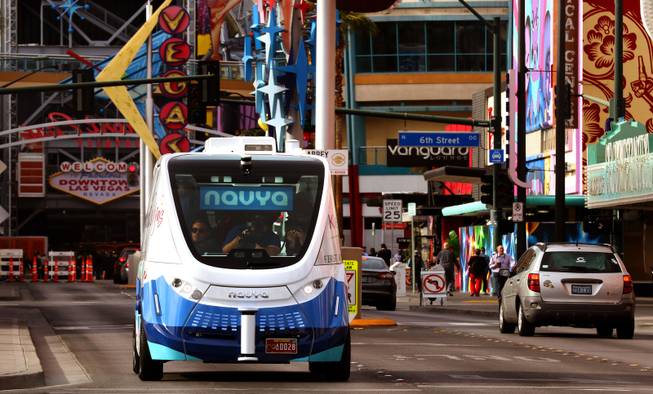
The nation’s first completely autonomous, fully electric shuttle was deployed in the Innovation District in downtown Las Vegas on Tuesday, Jan. 10, 2017.
Wednesday, Dec. 15, 2021 | 4 a.m.
A group that analyzes clean energy strategy is recommending the city of Las Vegas set and track communitywide goals for greenhouse gas emissions, establish and track metrics related to energy equity, and contribute to the development of a clean energy workforce, among other suggestions in a report released this morning.
The American Council for an Energy-Efficient Economy (ACEEE) conducted an independent analysis of cities’ clean energy policies with hopes of combating climate change and reducing energy waste, scoring 100 U.S. cities on their clean energy strategies.
The scorecard was broken down by five categories — communitywide initiatives, buildings policies, transportation policies, energy and water utilities, and local government operations — each of which has a total number of points.
The highest possible score was 100, with San Francisco registering a study-best 74 points. It was followed by Seattle, Washington, D.C., Minneapolis and Boston. Las Vegas was 31st with 38 points, Reno 61st at 22 points, and Henderson 82nd with 11 points.
The information reflects policies up to July, the report says, and it is designed to “track local clean energy initiatives that are designed to reflect policy best practices, advance racial and social equity, or use innovative approaches to reduce (greenhouse gas) emissions.” A team of 12 climate change specialists authored the report.
“The City Scorecard is an educational resource to inform policymakers and interested citizens seeking to advance clean energy,” the report states. “We would present only a partial picture of a city’s clean energy policy environment if we were to focus solely on city actions.”
Las Vegas scored best in local government operations with six out of 10 points. In communitywide initiatives, it received five-and-a-half out of 15 points, 10.5 of 30 points in buildings policies, 11 of 30 points in transportation policies and 5 of 15 points in energy and water utilities.
The report also recommended Las Vegas adopt solar- and electric vehicle-ready requirements in building codes; adopt more policies and programs targeting energy efficiency in existing buildings, like retrocommissioning and audit requirements and incentives that particularly target low-income housing; expand high-quality transit access for low-income residents; increase the deployment of electric vehicle charging infrastructure; and adopt and track a goal for reduction in emissions from the transportation sector.
Marco Velotta, city planner for Las Vegas, said that while the scorecard attempts to be as objective as possible, there are parts of its recommendations that the city is already addressing, as outlined in its 2050 Master Plan, that may not be visible to the organization.
There are also efforts, including solar power, that are outside the city’s control — NV Energy, for example, offers community solar, not the city, he said.
Velotta also said the city’s 2050 Master Plan adequately addresses many of the scorecard’s concerns, including claims that the city does not take an equity-based approach in its sustainability efforts. Velotta said the city aims to do area-specific planning in places like east Las Vegas, where low-income residents are further harmed by climate change.
“The 2050 Plan lays a lot of it out, and that’ll be our road map for the future,” Velotta said. “We’re at the beginning of that effort, but the goal is to reduce pollution exposure and addressing those areas with higher vulnerability.”
Henderson received seven-and-a-half of 30 points in buildings policies as part of its scorecard. It received zero of 15 points in communitywide initiatives, two-and-a-half of 30 points in transportation policies, one of 15 points in energy and water utilities and zero of 10 points in local government operations.
Lance Olson, assistant public works director for Henderson, said he was surprised to see his city's low score for transportation policies. Both Henderson and Las Vegas are part of the Southern Nevada Regional Transportation Commission, which offers service on 39 routes on over 400 vehicles. But according to the study, low-income households have no access to high-quality transit, and the city has only 7.8 electric vehicle charging ports per 100,000 people. Olson said this is something the city is working on improving in collaboration with Clark County. The city-owned vehicles are a mix of 100% renewable, a hybrid model or gas-powered car, he said.
“Charging stations are definitely a challenging topic for logistics,” he said. “Trying to find the necessary power at existing facilities and upgrade that power to handle the charging needs is something we continually work on and is a challenge for us.”
Kathleen Richards, senior public information officer for the city, said the report did not acknowledge the city’s transition to LED lights in its covered streetlights, which is currently happening. The city also received an approximately $40 million grant to update about seven miles of Boulder Highway, including the public transportation that runs on it, she said.
Richards also said that the city reduced its greenhouse gas emissions from electricity purchases by more than 43%, or about 29,000 tons, since 2005 and that the city currently has an agreement with NV Energy to transition 100% of its non-utility electrical load to solar resources in the next three years.
“We wish they might have, you know, done more than a cursory glance at all the data that we have, but that’s OK,” Richards said. “We’ll reach out to them and take care of it.”
